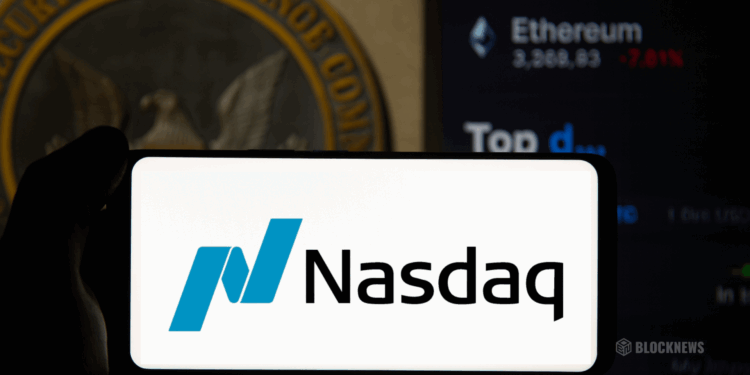- Nasdaq seeks SEC approval to list tokenized stocks and ETFs alongside traditional shares.
- Trades could settle onchain via the Depository Trust Company as early as 2026.
- Proposal emphasizes investor protection, pushing back on overseas models lacking shareholder rights.
Nasdaq is making a historic move that could bring blockchain-based settlement directly into U.S. markets. The exchange has filed a rule change with the SEC, asking for approval to list tokenized versions of stocks and ETFs right alongside their traditional counterparts on the same order book. If approved, this would mark the first time tokenized shares and regular securities trade side by side in the U.S. — and it could roll out as early as Q3 2026.
How Tokenized Trading Would Work
Under Nasdaq’s plan, tokenized shares would carry all the same rights and privileges as the underlying stock or ETF. That means no shortcuts: investors would hold the same protections and ownership rights as they do with traditional shares. Once the central clearing infrastructure is ready, trades could settle onchain, with the Depository Trust Company expected to play a critical role in supporting the system.
Why This Matters Now
The filing comes as the SEC updates its agenda to expand crypto and tokenization in national markets. Wall Street firms are already exploring tokenization at scale, arguing that it could make settlement faster, cheaper, and more transparent. Nasdaq’s proposal pushes back against looser overseas models, which often sell tokenized U.S. equities without granting full shareholder rights. Instead, Nasdaq is positioning its framework as a higher standard — one that blends blockchain efficiency with long-standing investor safeguards.
Industry Reaction and Next Steps
Not everyone is pushing for exemptions. Citadel Securities, in a July letter to the SEC, stressed that the agency should avoid carving out exceptions to securities rules and instead focus on liquidity and consistent protections. Nasdaq’s approach echoes that sentiment, suggesting tokenization can evolve within the same rules that govern traditional securities.
If the SEC signs off, this could become one of the most significant shifts in U.S. market infrastructure in decades, potentially making tokenized settlement a mainstream feature of Wall Street trading.














